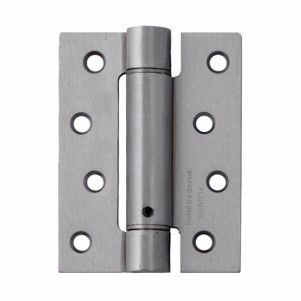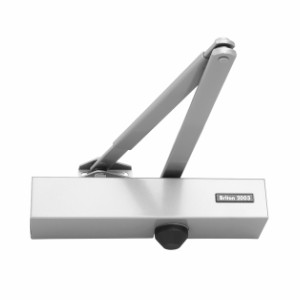Spring hinges vs door closers - which one is better for your project?
In many commercial operations there is a need to have an automatic door closing process. This can be for practical reasons, but also for health and safety compliance, security reasons and accessibility reasons. There are various options for a business to consider when assessing automatic door closing, but two of the most popular are spring hinges and door closers. Fundamentally these offer a similar function, but are very different in design and have different characteristics which make them suitable in some cases but not in others.
Here we will study spring hinges and door closers to help you make an informed decision on what is best for you, and will support this decision with information based on applications and suitability against different criteria. But first let’s understand exactly what each one is.
What is a spring hinge and what are the pros and cons?
A spring hinge is a type of self-closing hinge that is fitted in the same way that a normal door hinge is fitted. The spring hinge has a built-in spring mechanism that ensures the door closes automatically once it has been opened. This works by releasing the tension that builds up in the spring hinge.
The benefits of the spring hinge are essentially that it is a simple and cheap design and requires no special installation skills above those normally associated with installing a door hinge. The door closing process is quick and effective, and because the spring hinge is so simple, it carries very little cost, so is effective for low budget projects.
On the flipside, there are some disadvantages to the spring hinge. Once it is fitted it has no facility for adjustability, so you won’t be able to control the closing force or speed. And because the spring hinge relies on built-in tension to perform the closing action, this can sometimes be inconsistent.
As a result, spring hinges are best suited for light to medium doors with relatively low traffic. This would suit a residential setting, including care homes and student accommodation. It would also suit some hospitality settings where there is low traffic, such as small hotels, bars and restaurants.
What is a door closer and what are the pros and cons?
A door closer is a mechanical system designed to give you total control over closing a door automatically. Some door closers use pneumatic or hydraulic systems to provide precision control, and the most common system is a two-piece door closer known as a rack and pinion system. This has a control box fitted to the top of the door itself, and then a pivoted arm which is attached to the box and the door frame. This works to control the door closing action for you.
Door closers have various benefits which primarily start with the fact you have much more control over the door closing action, compared to spring hinges. This includes the speed of the door closing and the force required to close it. This element of control means door closers are better where fire safety or security management dictates that certain doors HAVE to be closed, and you need to have a degree of certainty over that. Door closers can be fitted with a system called ‘backcheck’, which is essentially what controls the door’s action, and this also protects the door from damage and protects the people using it. Door closers are therefore suitable for a wider range of doors and for more applications and locations.
The disadvantage with door closers is that this additional functionality comes at a cost, but not one that outweighs the many benefits it brings, and the door closer is therefore an essential investment for most building projects. There is also a small element of maintenance required for some door closers.
Door closers can be used on pretty much any door, but are particularly suitable for heavier doors and those that are used on a frequent basis. So high traffic doors such as a busy commercial office, retail stores, schools or hospitals, would suit a door closer.
Considerations when choosing between a spring hinge and a door closer
So when you are assessing whether to invest in a spring hinge or a door closer, you need to think about the following:
- Door weight and size
- Traffic volume
- Desired closing speed and force
- Accessibility
- Fire safety
- Security
- Budget
The door closer provides a durable and robust solution for all types of door, and gives you more precision over the closing action. It is also better for situations where accessibility, fire safety and security is a factor. This makes the door closer more suitable for a much wider range of applications, door types and building environments. The spring hinge, alternatively, is suitable for low budget projects using light to medium doors and where traffic volume is expected to be light. You can check out our range of door closers and spring hinges at MB Direct and find the design that suits your project and order online today.